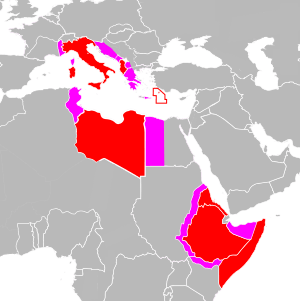2nd Libyan Division Pescatori
| 2nd Libyan Division Pescatori | |
|---|---|
| Active | 1939–1941 |
| Country | Italy |
| Branch | Italian Army |
| Type | Infantry |
| Size | Division |
| Nickname(s) | Pescatori |
| Engagements | World War II |
The 2nd Libyan Division Pescatori was an Infantry Division of the Corps of Libyan Troops of the Italian Army during World War II. In December 1940, it was in Libya as part of the Italian XXIII Corps together with the 1st Blackshirt Division 23 Marzo and 2nd Blackshirt Division 28 Ottobre, took part in the Italian invasion of Egypt and was destroyed during Operation Compass.[1]
Egypt
The advance into Egypt started on 9 September; the plan was modified to work around the shortage of transport. A flanking move through the desert was cancelled and the 1st Libyan Division and the 2nd Libyan Division Pescatori were brought close to the coast road to act as the spearhead for the infantry divisions of XXIII Corps. The Maletti Group would operate as a flank guard. In essence, Berti was to use his artillery and tanks as escorts to his infantry as his force advanced through hostile territory.[2] Following the Italian advance, the British planned a limited operation to push the Italians back. They had noted that the Italian defensive positions were dispersed with fortified camps separated by large distances which meant they could not provide mutual support.[3] The attack Operation Compass, was originally planned as a five-day raid.[4] On 9 December, the 2nd Libyan Division was located at Tummar.[5] The attack commenced on Tummar at 13.50, after 7 Royal Tank Regiment had refuelled and re-armed and artillery had softened up the defences for an hour. A north-west approach was made and the tanks broke through the perimeter without too much difficulty and were followed twenty minutes later by the infantry. However, the defenders put up stronger opposition than at Nibeiwa[nb 1] but by 16.00 Tummar West was overrun, except for extreme north-east corner.[6] The tanks shifted their point of attack to Tummar East, the greater part of which was captured by nightfall.[7]
Sidi Barrani
On 10 December, 16 Infantry Brigade was brought forward from the 4th Indian Division reserve and with elements of 11th Indian Brigade under command were sent forward in lorries to attack Sidi Barrani. Moving forward it was in position barring the south and south-western exits to Sidi Barrani by 13.30. At 16.00, supported by the whole of the division's artillery, the attack, again with the support of 7th RTR, went in. The town was captured by nightfall[3] and the remains of the two Libyan Divisions and the 4th Blackshirt Division were trapped between 16th Infantry Brigade and Selby Force.[8] By 15 December, Sollum and Halfya had been captured as well as Fort Capuzzo, while all Italian forces had been cleared from Egypt.[3] The 2nd Libyan Division lost 26 officers and 1,327 men killed and 32 officers and 804 men wounded, with the survivors being taken prisoner.[9]
Commander
- Major General Armando Pescatori
Order of battle
Notes
- Footnotes
- ↑ The Official History records that "the Italian gunners fought courageously"[6]
- ↑ An Italian Infantry Division normally consisted of two Infantry Regiments (three Battalions each), an Artillery Regiment, a Mortar Battalion (two companies), an Anti Tank Company, a Blackshirt Legion of two Battalions was sometimes attached. Each Division had only about 7,000 men, The Infantry and Artillery Regiments contained 1,650 men, the Blackshirt Legion 1,200, each company 150 men.[11]
- Citations
- ↑ Jowett, p.10
- ↑ Macksey, p.38
- 1 2 3 Wavell in "No. 37628". The London Gazette (Supplement). 25 June 1946. p. 3264.
- ↑ Playfair, p. 264
- ↑ Macksey, p. 68
- 1 2 Playfair, p.268
- ↑ Playfair p. 269
- ↑ Playfair p. 270
- ↑ USSME, La prima offensiva Britannica in Africa Settentrionale, tomo I, allegato 32 (page 375).
- ↑ Jowett, p. 9
- ↑ Paoletti, p 170
- Jowett, Philip S. (2000). The Italian Army 1940-45 (1): Europe 1940-1943. Osprey, Oxford - New York. ISBN 978-1-85532-864-8.
- Macksey, Major Kenneth (1971). Beda Fomm: Classic Victory. Ballentine's Illustrated History of the Violent Century, Battle Book Number 22. Ballantine Books.
- Paoletti, Ciro (2008). A Military History of Italy. Greenwood Publishing Group. ISBN 0-275-98505-9.
- Playfair, Major-General I.S.O.; with Stitt R.N., Commander G.M.S.; Molony, Brigadier C.J.C. & Toomer, Air Vice-Marshal S.E. (2004) [1st. pub. HMSO 1954]. Butler, J.R.M, ed. The Mediterranean and Middle East, Volume I The Early Successes Against Italy (to May 1941). History of the Second World War, United Kingdom Military Series. Naval & Military Press. ISBN 1-84574-065-3.
